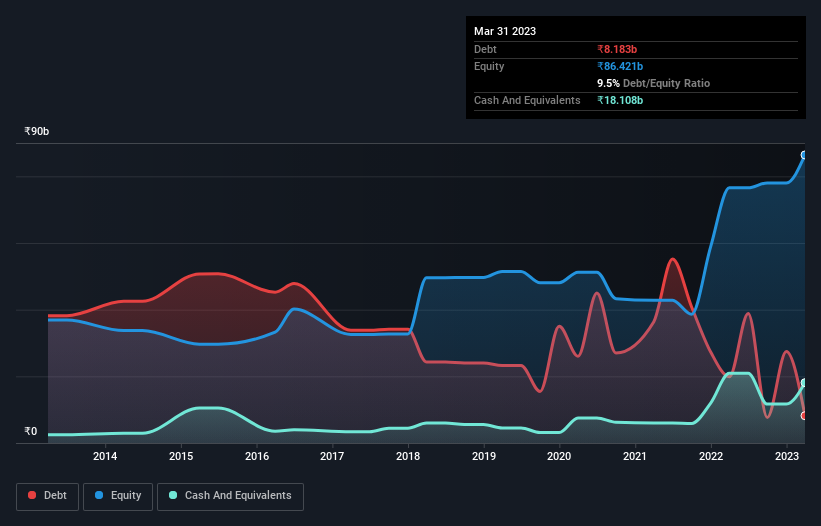
Some say volatility, rather than debt, is the best way to think about risk as an investor, but Warren Buffett famously said that 'Volatility is far from synonymous with risk.' It's only natural to consider a company's balance sheet when you examine how risky it is, since debt is often involved when a business collapses. We note that The Indian Hotels Company Limited (NSE:INDHOTEL) does have debt on its balance sheet. But the real question is whether this debt is making the company risky.
What Risk Does Debt Bring?
Generally speaking, debt only becomes a real problem when a company can't easily pay it off, either by raising capital or with its own cash flow. Ultimately, if the company can't fulfill its legal obligations to repay debt, shareholders could walk away with nothing. However, a more common (but still painful) scenario is that it has to raise new equity capital at a low price, thus permanently diluting shareholders. By replacing dilution, though, debt can be an extremely good tool for businesses that need capital to invest in growth at high rates of return. When we think about a company's use of debt, we first look at cash and debt together.
See our latest analysis for Indian Hotels
What Is Indian Hotels's Debt?
The image below, which you can click on for greater detail, shows that Indian Hotels had debt of ₹8.18b at the end of March 2023, a reduction from ₹19.8b over a year. But on the other hand it also has ₹18.1b in cash, leading to a ₹9.93b net cash position.

How Healthy Is Indian Hotels' Balance Sheet?
Zooming in on the latest balance sheet data, we can see that Indian Hotels had liabilities of ₹21.2b due within 12 months and liabilities of ₹29.1b due beyond that. On the other hand, it had cash of ₹18.1b and ₹5.20b worth of receivables due within a year. So its liabilities outweigh the sum of its cash and (near-term) receivables by ₹27.0b.
Since publicly traded Indian Hotels shares are worth a total of ₹546.3b, it seems unlikely that this level of liabilities would be a major threat. Having said that, it's clear that we should continue to monitor its balance sheet, lest it change for the worse. While it does have liabilities worth noting, Indian Hotels also has more cash than debt, so we're pretty confident it can manage its debt safely.
Better yet, Indian Hotels grew its EBIT by 2,008% last year, which is an impressive improvement. That boost will make it even easier to pay down debt going forward. The balance sheet is clearly the area to focus on when you are analysing debt. But it is future earnings, more than anything, that will determine Indian Hotels's ability to maintain a healthy balance sheet going forward. So if you want to see what the professionals think, you might find this free report on analyst profit forecasts to be interesting.
Finally, a business needs free cash flow to pay off debt; accounting profits just don't cut it. Indian Hotels may have net cash on the balance sheet, but it is still interesting to look at how well the business converts its earnings before interest and tax (EBIT) to free cash flow, because that will influence both its need for, and its capacity to manage debt. During the last two years, Indian Hotels generated free cash flow amounting to a very robust 95% of its EBIT, more than we'd expect. That puts it in a very strong position to pay down debt.
Summing Up
We could understand if investors are concerned about Indian Hotels's liabilities, but we can be reassured by the fact it has has net cash of ₹9.93b. And it impressed us with free cash flow of ₹11b, being 95% of its EBIT. So is Indian Hotels's debt a risk? It doesn't seem so to us. Above most other metrics, we think its important to track how fast earnings per share is growing, if at all. If you've also come to that realization, you're in luck, because today you can view this interactive graph of Indian Hotels's earnings per share history for free.
At the end of the day, it's often better to focus on companies that are free from net debt. You can access our special list of such companies (all with a track record of profit growth). It's free.
New: AI Stock Screener & Alerts
Our new AI Stock Screener scans the market every day to uncover opportunities.
• Dividend Powerhouses (3%+ Yield)
• Undervalued Small Caps with Insider Buying
• High growth Tech and AI Companies
Or build your own from over 50 metrics.
Have feedback on this article? Concerned about the content? Get in touch with us directly. Alternatively, email editorial-team (at) simplywallst.com.
This article by Simply Wall St is general in nature. We provide commentary based on historical data and analyst forecasts only using an unbiased methodology and our articles are not intended to be financial advice. It does not constitute a recommendation to buy or sell any stock, and does not take account of your objectives, or your financial situation. We aim to bring you long-term focused analysis driven by fundamental data. Note that our analysis may not factor in the latest price-sensitive company announcements or qualitative material. Simply Wall St has no position in any stocks mentioned.
About NSEI:INDHOTEL
Indian Hotels
Owns, operates, and manages hotels, palaces, and resorts in India and internationally.
Flawless balance sheet with solid track record.

